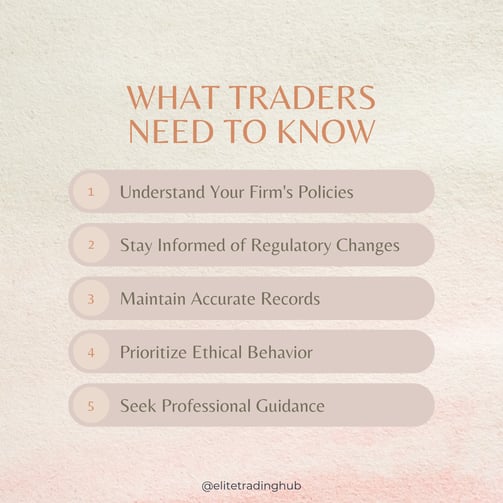Navigating Prop Firm Regulations: What Traders Need to Know 📜
As the world of prop trading continues to evolve, it's essential for both aspiring and experienced traders to understand the regulatory landscape that governs prop firms. Navigating the complex web of rules and guidelines can be a daunting task, but it's a critical aspect of ensuring the long-term success and compliance of your prop trading venture. 🔍 In this comprehensive blog post, we'll dive deep into the regulatory requirements that prop firms and traders must adhere to, providing you with the knowledge and insights you need to operate within the boundaries of the law while maximizing your trading potential. 💪
The Regulatory Environment for Prop Firms 🏢
Prop firms, unlike traditional investment management firms, are subject to a different set of regulatory requirements. While the specific rules and regulations can vary across different jurisdictions, there are several key areas that prop firms must address:
Registration and Licensing: Prop firms are typically required to register with the appropriate regulatory bodies, such as the Securities and Exchange Commission (SEC) in the United States or the Financial Conduct Authority (FCA) in the United Kingdom. This process ensures that prop firms meet the necessary qualifications and standards to engage in trading activities.
Capital Requirements: Regulatory authorities often impose minimum capital requirements on prop firms, ensuring that they have sufficient financial resources to withstand market volatility and meet their obligations to clients and counterparties.
Risk Management: Prop firms must demonstrate robust risk management practices, including the implementation of risk limits, position sizing controls, and stop-loss mechanisms. Regulators closely monitor a firm's ability to identify, measure, and mitigate the risks inherent in their trading activities.
Compliance and Reporting: Prop firms are required to adhere to various compliance regulations, such as record-keeping, anti-money laundering (AML) procedures, and regular reporting to regulatory bodies. Failure to comply with these requirements can result in significant penalties and reputational damage.
Client Protection: In some jurisdictions, prop firms may be subject to client protection rules, which mandate the segregation of client funds, disclosure of risks, and the implementation of dispute resolution mechanisms.
What Traders Need to Know 🧑💻


As a trader operating within a prop firm, it's crucial to understand the regulatory landscape and how it impacts your day-to-day activities. Here are some key considerations:
Understand Your Firm's Policies: Familiarize yourself with your prop firm's internal policies and procedures, which are designed to ensure compliance with regulatory requirements. These may include guidelines on trading limits, risk management, and reporting.
Stay Informed of Regulatory Changes: Keep up-to-date with the latest regulatory updates and changes that may affect your prop firm's operations. This will help you anticipate and adapt to any new requirements or compliance measures.
Maintain Accurate Records: Meticulous record-keeping is essential for prop traders. Ensure that you document all your trading activities, including orders, executions, and risk management decisions, to facilitate regulatory audits and reporting.
Prioritize Ethical Behavior: Prop trading requires the utmost integrity and ethical conduct. Avoid any actions that could be perceived as market manipulation, insider trading, or other forms of misconduct, as these can result in severe penalties and reputational damage.
Seek Professional Guidance: If you're unsure about the regulatory implications of your trading activities or your prop firm's policies, consider seeking guidance from compliance professionals or legal experts. They can provide valuable insights and help you navigate the complexities of the regulatory landscape.
The Benefits of Regulatory Compliance 🏆
While navigating the regulatory environment for prop firms may seem daunting, it's important to recognize the numerous benefits that come with maintaining regulatory compliance:
Enhanced Credibility and Trust: Prop firms that demonstrate a strong commitment to regulatory compliance are often viewed as more trustworthy and reliable by industry peers, investors, and potential clients.
Reduced Legal and Financial Risks: Adherence to regulatory requirements can help prop firms avoid costly legal battles, fines, and penalties, ultimately protecting their trading capital and long-term sustainability.
Competitive Advantage: Prop firms that excel in regulatory compliance may gain a strategic edge over their competitors, as they are better equipped to weather regulatory scrutiny and adapt to changing market conditions.
Operational Efficiency: Establishing robust compliance processes and procedures can improve a prop firm's overall operational efficiency, streamlining their trading activities and decision-making processes.
Talent Attraction: Prop firms that are recognized for their commitment to regulatory compliance may find it easier to attract and retain top-talent traders who value the stability and integrity of their work environment.
Conclusion: Embracing Regulatory Compliance for Prop Trading Success 🏆
In the ever-evolving world of prop trading, navigating the regulatory landscape is a critical component of long-term success. By understanding the key regulatory requirements, prop firms and traders can position themselves for sustainable growth, mitigate legal and financial risks, and establish a reputation for integrity and excellence.
Remember, regulatory compliance is not just a box to be checked - it's a strategic imperative that can unlock a wealth of opportunities and competitive advantages. So, embrace the challenge, stay informed, and let regulatory compliance be the foundation upon which you build your prop trading empire. 🚀
